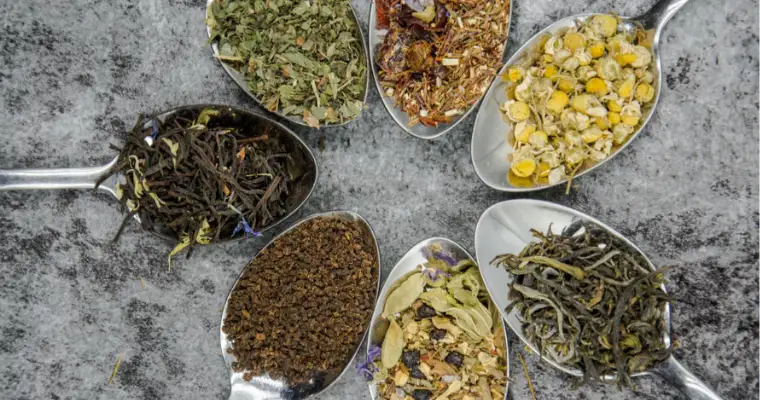What is Healthy Tea?

Welcome, as we journey towards a healthier lifestyle, we cannot overlook the many advantages that come with embracing teas as a part of our daily dietary choices.
Teas are not only comforting and versatile beverages, but they also offer a myriad of health benefits derived from various plants.
In this blog post, we’ll explore the names, uses, and advantages of some remarkable teas that complement a Whole Food Plant-Based diet.
So, grab your favorite mug, and let’s dive into the What is Healthy Tea!
What is Healthy Tea List:
Chamomile Tea: Relaxation in a Cup Chamomile tea, derived from the daisy-like chamomile plant, is renowned for its calming effects. It aids in reducing stress and promoting better sleep. Its mild, floral flavor makes it a delightful beverage to unwind after a busy day.
Green Tea: Your Antioxidant Boost Green tea, made from unoxidized tea leaves, is a powerhouse of antioxidants. It supports heart health, boosts metabolism, and aids in weight management. Its subtle grassy taste pairs well with various dishes.
Peppermint Tea: Refreshing and Digestive Peppermint tea, infused with the aromatic peppermint plant, offers a refreshing taste with digestive benefits. Soothing an upset stomach, reduce bloating, and even relieve indigestion.
Hibiscus Tea: Bursting with Vitamin C Hibiscus tea, made from dried hibiscus flowers, is a tangy and vibrant brew. Rich in vitamin C, it bolsters the immune system, lowers blood pressure, and supports cardiovascular health.
Ginger Tea: Soothing and Immune-Boosting Ginger tea, crafted from fresh ginger roots, has a spicy and invigorating flavor. It aids in easing nausea, reducing inflammation, and strengthening the immune system.
Rooibos Tea: Caffeine-Free Goodness Rooibos tea, originating from the South African red bush plant, is caffeine-free and brimming with antioxidants. It supports skin health, aids digestion, and promotes a healthy heart.
Turmeric Tea (Golden Milk): Anti-Inflammatory Powerhouse Turmeric tea, also known as Golden Milk, combines turmeric with plant-based milk for a soothing, anti-inflammatory potion. It eases joint pain, enhances brain health, and boosts the immune system.
Dandelion Tea: Detoxifying and Nutrient-Rich Dandelion tea, brewed from dandelion roots and leaves, is a natural detoxifier. It aids in liver health, supports digestion, and provides essential vitamins and minerals.
Matcha Tea: Energizing and Antioxidant-Rich Matcha tea, finely ground green tea leaves, provides a concentrated source of antioxidants. Its unique preparation process preserves the nutrients, resulting in a vibrant green powder. This energizing tea boosts metabolism, enhances focus, and promotes a sense of calm.
Lemon Verbena Tea: Uplifting and Aromatic Lemon verbena tea, made from the leaves of the lemon-scented herb, offers a zesty and uplifting flavor. It aids in reducing anxiety, easing muscle tension, and supporting healthy digestion.
Nettle Tea: Nutrient-Packed and Nourishing Nettle tea, brewed from stinging nettle leaves, is a nutrient-rich herbal infusion. It contains vitamins, minerals, and antioxidants that promote overall well-being. Nettle tea is known for its potential to alleviate allergy symptoms and support joint health.
Lavender Tea: Serene and Stress-Relieving Lavender tea, infused with fragrant lavender flowers, has a calming and soothing effect. This tea helps combat insomnia, reduces stress, and may aid in relieving headaches.
Cinnamon Tea: Warming and Blood Sugar Supportive Cinnamon tea, made from cinnamon bark, has a warm and comforting taste. It may help stabilize blood sugar levels, boost brain function, and support heart health.
Echinacea Tea: Immune-Boosting Herbal Remedy Echinacea tea, derived from the Echinacea plant, is a popular herbal remedy to strengthen the immune system. It aids in preventing and reducing the duration of common colds and flu.
Rosehip Tea: Vitamin C Powerhouse Rosehip tea, made from the fruit of the wild rose plant, packed with vitamin C and antioxidants. It supports immune health, promotes healthy skin, and may aid in joint inflammation.
Lemon Balm Tea: Calming and Digestive Supportive Lemon balm tea, crafted from the lemon-scented herb, has a mild and lemony taste. It aids in reducing stress, improving mood, and supporting digestive health.
Oolong Tea: Balanced Flavor and Metabolism Boost Oolong tea, partially oxidized tea leaves, strikes a balance between green and black teas. It contains catechins that promote fat burning, aids in digestion, and supports heart health.
Sencha Tea: Light and Revitalizing Sencha tea, a classic Japanese green tea, offers a refreshing and grassy flavor. Its high antioxidant content helps protect against cell damage and supports overall health.
From relaxation to rejuvenation, from immune support to digestive aid, these teas bring a symphony of flavors and wellness to our daily lives.
What is Healthy Tea and the Culture:

Tea has a deep-rooted cultural significance in different regions worldwide.
In China, the birthplace of tea, it is regarded as a symbol of harmony and respect. Traditional tea ceremonies are performed to show appreciation and respect to guests and elders.
In Japan, tea ceremony known as Sado (the Way of Tea), is a highly ritualistic and artistic practice that revolves around the preparation, serving, and consumption of matcha (powdered green tea).
Rooted in Zen Buddhism, the tea ceremony embodies principles of harmony, respect, purity, and tranquility.
In India, chai is an integral part of daily life and social gatherings. The spiced tea blend, typically brewed with black tea, milk, and spices, is offered as a gesture of hospitality and warmth.
In Morocco, the serving of mint tea, known as Maghrebi mint tea or Moroccan mint tea, is an art form. It symbolizes friendship and is often served in three rounds, each with a distinct flavor and significance.
Tea ceremonies and rituals not only connect people with nature but also foster connections between individuals, promoting a sense of community and unity.
As we embrace a plant-based lifestyle, understanding the cultural significance of tea can deepen our appreciation for these beverages and the traditions surrounding them.
Health Benefits of Drinking Tea:
What is healthy Tea? A beloved beverage enjoyed by cultures worldwide, not only warms the soul but also offers many health benefits.
Choosing the right teas for a healthy lifestyle green to black, herbal to white, each type of tea carries its unique set of compounds that promote well-being and nourish the body.
Let us explore the *science-backed advantages of sipping tea.
Antioxidant Powerhouse: Teas are rich in antioxidants, such as catechins, flavonoids, and polyphenols. These potent compounds help neutralize free radicals in the body, protecting cells from oxidative stress and reducing the risk of chronic diseases.
Heart Health: Regular tea consumption has been associated with improved heart health. Studies suggest that tea may help lower bad cholesterol levels, reduce blood pressure, and enhance blood vessel function, all of which contribute to a healthier cardiovascular system.
Brain Boost: The combination of caffeine and L-theanine found in tea has been linked to improved cognitive function, focus, and mental alertness. Tea drinkers may experience enhanced memory and reduced risk of neurodegenerative conditions.
Weight Management: Certain types of tea, such as green tea and Oolong tea, have been found to aid in weight management. These teas can boost metabolism, promote fat burning, and support healthy digestion, making them valuable additions to a balanced diet and exercise routine.
Immune Support: The natural compounds in tea, including catechins and epigallocatechin gallate (EGCG), have immune-boosting properties. Regular tea consumption can help strengthen the body’s defense against infections and reduce the duration of common colds and flu.
Digestive Aid: Herbal teas like peppermint, ginger, and chamomile have been used for centuries to soothe digestive issues. They can alleviate bloating, reduce indigestion, and promote a healthy gut.
Skin Health: Tea’s antioxidant content can also benefit the skin. Antioxidants help protect the skin from damage caused by UV rays and environmental pollutants, contributing to a more youthful and radiant complexion.
Stress Relief: The act of sipping a warm cup of tea itself can be comforting and calming. Moreover, certain teas, like chamomile and lavender, contain compounds that have relaxing effects, helping to reduce stress and anxiety.
Incorporating tea into your daily routine is a delightful and health-conscious choice. However, it’s essential to enjoy tea in moderation and choose natural and organic options whenever possible to reap its full benefits.
Serving Suggestions
Hot Tea: Steep the tea of your choice in hot water (not boiling) for the recommended time.
For black and herbal teas, steep for 3-5 minutes; for green and white teas, steep for 2-3 minutes; and for delicate teas, steep for 1-2 minutes.
Iced Tea: For a refreshing iced tea, steep the tea as usual and then chill it in the refrigerator. Serve over ice and add sweeteners or fruit slices if desired.
Tea Lattes: Create creamy and nourishing tea lattes by adding your favorite plant-based milk to brewed tea. Froth the milk for an indulgent touch.
Blends and Mixes: Get creative by mixing different teas or adding spices, herbs, and fruits to create your unique blends.
Herbal Infusions: For herbal teas and tisanes, use boiling water and steep for 5-7 minutes to extract the full flavor and health benefits.
Conclusion
As we conclude, our What is Healthy tea for your Whole Food Plant-Based lifestyle, we are reminded of the endless possibilities’ nature provides us.
You discover not only the health benefits but also the rich cultural significance they carry.
Additionally, from traditional ceremonies to modern blends teas offer an opportunity to connect with nature, foster community, and indulge in a moment of tranquility.
So, as you savor each cup of tea, remember the diverse plant-based offerings available to you.
Allow the flavors, aromas, and rituals of tea to enhance your whole food plant-based lifestyle, nurturing your well-being and nurturing your connection with the world around you.
Let the Magic of Tea infuse your life with health, joy, and harmony. Cheers to a vibrant thriving Plant-Based journey!
Be sure to sign up for your > Free 12 Tips Food Guide <
Cheers,
Plantaful Life Team
staging-plantafullife-com.siterubix.com
Disclaimer: The information shared in this blog post and on our website is for educational and informational purposes only. We are here to inspire and support you on your plant-based journey. However, always prioritize your health and consult with your trusted healthcare provider for personalized advice. By using our website, you acknowledge and agree that you have read and understood this medical disclaimer, and you acknowledge the significance of seeking professional medical advice for your specific health needs.
*Material References:
- Khalesi S, Sun J, Buys N, et al. Green tea catechins and blood pressure: A systematic review and meta-analysis of randomised controlled trials. European Journal of Nutrition European Journal of Nutrition | Home (springer.com)
- Liu QP, Wu YF, Cheng HY, et al. Habitual tea consumption and risk of cognitive decline in older adults: a prospective study. The American Journal of Clinical Nutrition, 2016, 103(4), 1053-1064.Home Page: The American Journal of Clinical Nutrition
- Zheng XX, Xu YL, Li SH, et al. Green tea intake lowers fasting serum total and LDL cholesterol in adults: a meta-analysis of 14 randomized controlled trials. The American Journal of Clinical Nutrition, 2011, 94(2), 601-610. Home Page: The American Journal of Clinical Nutrition
- Yang YC, Lu FH, Wu JS, et al. The protective effect of habitual tea consumption on hypertension. Archives of Internal Medicine, 2004, 164(14), 1534-1540. JAMA Internal Medicine – Improving Health and Health Care (jamanetwork.com)
- Williamson G. Possible effects of dietary polyphenols on sugar absorption and digestion. Molecular Nutrition & Food Research, 2013, 57(1), 48-57 Molecular Nutrition & Food Research – Wiley Online Library
- McKay DL, Blumberg JB. The role of tea in human health: An update. Journal of the American College of Nutrition, 2002, 21(1), 1-13. Home | American Nutrition Association (theana.org)
- McKay DL, Blumberg JB. A review of the bioactivity and potential health benefits of chamomile tea (Matricaria chamomilla L.). Phytotherapy Research, 2006, 20(7), 519-530. Phytotherapy Research | Medicinal Chemistry Journal | Wiley Online Library
